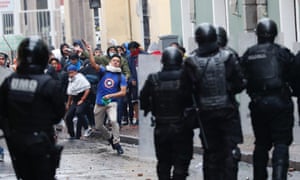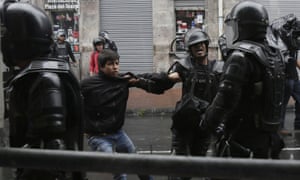Ecuador Declares State of Emergency as Protesters Decry End to Fuel Subsidies
Photo Credit: Dolores Ochoa/AP

On October 3 the Guardian reported that the President of Ecuador, Lenin Moreno, had just declared a State of Emergency in response to widespread strikes over the end of Ecuador’s 40-year fuel subsidy. The main supporters of the strikes are taxi, bus, and truck drivers who are severely impacted by the loss of the subsidy, as well as students, unions, and indigenous groups. The article makes no claim about general support for the strikes outside of these groups.
The strikers have so far blocked roads in Ecuador’s two largest cities, Quito (the capital) and Guayaquil (a port city), using the vehicles of taxi, bus, and truck drivers (the largest supporters of the strike). Strikers have also had several clashes with police, including one instance where masked strikers threw rocks at riot police, who responded with tear gas and armored vehicles. So far there have been 19 arrests for strike-related activities.

Moreno, the President of Ecuador since 2017, justified the State of emergency as necessary to “ensure citizen’s security and avoid chaos”. A State of Emergency allows the government to suspend certain freedoms and to use the armed forces to reestablish order. During a press conference, President Moreno condemned the fuel subsidy as “perverse” and argued that in it’s forty years of existence it had severely harmed Ecuador’s development. Ending the fuel subsidy would alleviate $2.27 billion out of a target $3.6 billion deficit reduction goal of Moreno’s government. President Moreno went on to say that protesters would not “paralyze” Ecuador. The Article also noted that three presidents between 1997 and 2007 had been removed though similar street protests.
I selected this article because it was the most detailed report on the story unfolding in Ecuador. An overview of other major news outlets yielded some conspicuously weak coverage. The BBC’s report had minimal detain but kept a relatively neutral tone. The New York Times coverage had more detail and contextual information and touched more on the disruption of business in Ecuador (including international travel). The Washington Post’s coverage was noticeably more critical of strikers and protesters, at least relative to the other outlets I looked at. Ecuador is portrayed as suffering from systemic economic issues as well as a tendency towards violence in protests.
Considering the statements by President Moreno and various protesters, unrest in Ecuador appears to be explained by political differences. The President is interested in ending subsidies, cutting corporate taxes, and working with international institutions to improve the economy. In February, he negotiated a $4.2 billion deal with the IMF, which is distrusted by many Ecuadorians who blame international forces with austerity policies. A sentiment apparent in many statements form protester is that the government has failed to keep promises and that they have not benefited citizens. This seemed to align well with what John Chasteen described and the right-left political spectrum in Latin America. Moreno’s policies cast him as a neoliberal, while the protesters support for subsidies and rejection of external influence is in line with Nationalism.
Some of James DeFronzo’s characteristics of successful revolutions are present here as well, notably mass frustration and political crisis. Support for strikes seems weaker among middle-class business owners (based on limited information) however, and it is unclear if elites are divided or if there are major external pressures on Ecuador.
The Guardian (main source): https://www.theguardian.com/world/2019/oct/03/ecuador-state-of-emergency-fuel-subsidies-protest
The BBC (video): https://www.bbc.com/news/world-latin-america-49929272
The New York Times: https://www.nytimes.com/2019/10/03/world/americas/ecuador-transit-strike-fuel-subsidy.html
The Washington Post: https://www.washingtonpost.com/business/ecuador-president-declares-state-of-emergency-over-strike/2019/10/03/2f0871a4-e613-11e9-b0a6-3d03721b85ef_story.html
